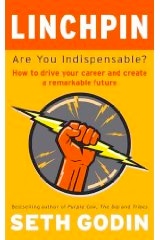Daniel Pink on motivation.
 I was very fortunate on Tuesday to get a last-minute invite (thanks to Ewan McIntosh) to a sold-out event at The Sage in Gateshead. The organisers of the event managed to get hold of Daniel Pink (Twitter), author of A Whole New Mind, as he came to the UK to promote his new book Drive: The Surprising Truth About What Motivates Us. I’d seen Dan’s TED Talk last year (see below) and found it extremely interesting. I was slightly concerned however, that he would just rehash that talk. He didn’t. 😀
I was very fortunate on Tuesday to get a last-minute invite (thanks to Ewan McIntosh) to a sold-out event at The Sage in Gateshead. The organisers of the event managed to get hold of Daniel Pink (Twitter), author of A Whole New Mind, as he came to the UK to promote his new book Drive: The Surprising Truth About What Motivates Us. I’d seen Dan’s TED Talk last year (see below) and found it extremely interesting. I was slightly concerned however, that he would just rehash that talk. He didn’t. 😀
 The warm-up guy for Dan was Caspar Berry (Twitter), former actor, professional poker player, screenwriter, television presenter, poker advisor on the James Bond film Casino Royale, and now consultant to large multinational companies. Caspar spoke about risk and the fear of failure. His main message was that in order to be successful you have to fail many times. If we redefine failure as long-term failure then this, as in poker, empowers us to take short-term set-backs, losses and ‘failures’. I appreciated his message, but felt that his constant references to how he was fitting a 45-minute presentation into 25 minutes a bit much to take. How hard is it to alter a slidedeck and tailor your talk for a particular audience? We teachers do it all the time… 😉
The warm-up guy for Dan was Caspar Berry (Twitter), former actor, professional poker player, screenwriter, television presenter, poker advisor on the James Bond film Casino Royale, and now consultant to large multinational companies. Caspar spoke about risk and the fear of failure. His main message was that in order to be successful you have to fail many times. If we redefine failure as long-term failure then this, as in poker, empowers us to take short-term set-backs, losses and ‘failures’. I appreciated his message, but felt that his constant references to how he was fitting a 45-minute presentation into 25 minutes a bit much to take. How hard is it to alter a slidedeck and tailor your talk for a particular audience? We teachers do it all the time… 😉
 I made quite a few notes on Dan Pink’s talk. I love the way he signposted, as all good teachers and presenters do, not only what he was going to talk about but also how he was going to deliver it. A good presentation, he believes, consists of:
I made quite a few notes on Dan Pink’s talk. I love the way he signposted, as all good teachers and presenters do, not only what he was going to talk about but also how he was going to deliver it. A good presentation, he believes, consists of:
- Brevity
- Levity
- Repetition
It also helped that his slides weren’t used to drive his talk but used almost exclusively for quotations from academic and business journals. I have to say that I was impressed that one came from this month’s Harvard Business Review! In addition, he had obviously tailored his slides (spellings, colloquialisms) for a UK audience. It would be easy not to do that on a worldwide book tour. 🙂
Using props and audience interaction, Dan started by explaining that we all have a biological drive that motivates us to do things – hunger, third, sex, and so on. No-one doubts that. We also have a ‘secondary drive’ that includes things like money, reward and punishment. Most efforts to motivate people centre around these two drives: we throw money at people to be more productive and more innovative: we appeal to people’s hunger and desires. A surprising study, however, by the Federal Reserve Bank in 2005 showed that, whilst financial incentives worked in a linear way for purely mechanical tasks (more reward = more productivity), if even ‘rudimentary cognitive skill’ was required, performance was inversely proportional (more reward = less problem-solving). The study, initially carried out in the USA was replicated with even more profound results in India.
Dan gave lots of examples of companies changing the way they do business in order to increase creativity, innovation and profitability. These went beyond Google’s famous 20% time, thankfully. I’ll not list them here – you should buy his book! The (false) assumption that most businesses have is that human beings are fundamentally inert, that they need external motivation to do things. Instead, Dan says, we should assume that people are active and engaged. Look at toddlers, for example: they’re always engaged! It’s actually our default setting. The third drive, then, is ‘interest’ which Dan divided down into:
- Autonomy
- Mastery
- Purpose
 Autonomy is tapping into people’s desire to be in control of their own lives. Using the example of call centres, Dan talked of how they treat people like lightbulbs: one burns out so we get another from the shelf and screw ’em! Zappos.com, a company recently bought by Amazon for close to $1bn, do things differently. They offer people $2000 to leave the company after the two-week training period, figuring that anyone tempted by such an offer would cost them more in the long-term. Once they’ve completed their training and refused the $2000 they are set to work with one message: “solve the customer’s problem”. No timers, no scripts. Revolutionary autonomy. 🙂
Autonomy is tapping into people’s desire to be in control of their own lives. Using the example of call centres, Dan talked of how they treat people like lightbulbs: one burns out so we get another from the shelf and screw ’em! Zappos.com, a company recently bought by Amazon for close to $1bn, do things differently. They offer people $2000 to leave the company after the two-week training period, figuring that anyone tempted by such an offer would cost them more in the long-term. Once they’ve completed their training and refused the $2000 they are set to work with one message: “solve the customer’s problem”. No timers, no scripts. Revolutionary autonomy. 🙂
Mastery is our powerful impulse to get better at stuff. In fact, a longitudinal study by Harvard Business Review of many companies found that the biggest motivator for employees across a whole range of industries was “making progress”. Dan talked about performance reviews, about how they’re not often enough. Imagine, he said, if Serena Williams received only annual feedback on her tennis. How would she improve? He encouraged us to take control of our own performance reviews and goal-setting, “calling yourself into the office” at the end of the month after having planned and set targets at the beginning of it.
Purpose is being part of a project bigger than yourself. Or, in the words of a McDonald’s executive, about having ‘a purpose bigger than your product’. For businesses it’s important to sell a dream or vision other than increasing profits by X% to motivate your staff. For individuals it’s important to motivate you for the smaller tasks and activities you need to complete.
 Dan said he could sum up his message by saying “human beings are not horses”. Here’s how he puts it in a recent interview with Seth Godin (who also has a new book out called Linchpin):
Dan said he could sum up his message by saying “human beings are not horses”. Here’s how he puts it in a recent interview with Seth Godin (who also has a new book out called Linchpin):
Stop treating people like horses and start treating them like human beings. Instead of trying to bribe folks with sweeter carrots or threaten them with sharpen sticks, how about giving them greater freedom at work, allowing them to get better at something they love, and infusing the workplace with a sense of purpose? If we tap that third drive more fully, we can rejuvenate or businesses and remake our world.
Amen to that! I’ll definitely be incorporating some of these ideas into #uppingyourgame: an educator’s guide to productivity. 😀


A great read for a Friday morning, Doug. Treating employees as humans, not horses is a simple and effective message from Mr Pink!
Indeed! He was awesome on many levels. :-)